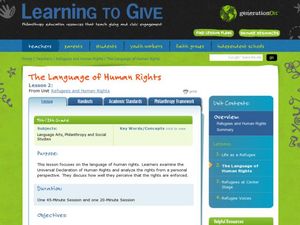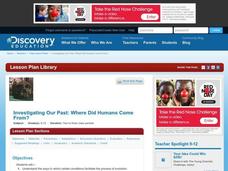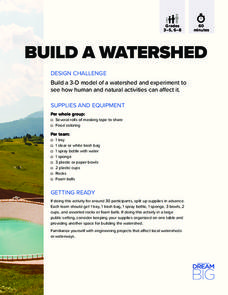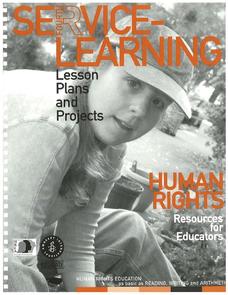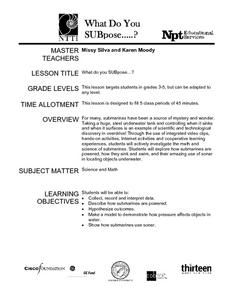Curated OER
What Are Your Human Rights?: Post World War II and Human Rights
High schoolers define and discuss human rights, make lists of human rights they think everyone deserves, and create class list of ten most important rights. Students then translate formal language of Universal Declaration of Human...
PBS
Universal Declaration of Human Rights
What rights are guaranteed to students? Do they align with the Universal Declaration of Human Rights, which was approved by the United Nations in 1948? Middle and high schoolers present persuasive arguments about the rights they believe...
Curated OER
The Language of Human Rights
Did you know that there are 15.2 million refugees in the world? High schoolers will read "The Universal Declaration of Human Rights" and learn how they can get involved to lower this surprising number. To really encourage involvement,...
Curated OER
Investigating Our Past: Where Did Humans Come From?
Investigate the theories of human evolution. In this research based lesson, learners research and discuss how geographic isolation, interbreeding, generalization, and specialization are factors in the history of humans. Groups work...
Curated OER
Human Rights
High schoolers read the Universal Declaration of Human Rights and then research countries which have had human right violations.
Advocates for Human Rights
Human Rights in the U.S.
Here's a fun, creative approach to the profoundly important issue of human rights. Young citizens do three activities, two of which involve them finding images from magazines that reflect human rights of their choosing and creating a...
Curated OER
I Wonder How the Manduca Life Cycle Compares To the Human Life Cycle...
Students study life cycles including developing their understanding of the human life cycle. They decide where they are in the human life cycle and provide reasons for that placement. They compare the human life cycle to that of the...
DiscoverE
Build a Watershed
What's the best way to learn how watersheds work? Build one! Combining engineering, the water cycle, and ecology concerns, the activity is the perfect fit for an interdisciplinary unit. Teams construct a model watershed with simple...
Curated OER
Human Body Lessons
Students read "The Magic School Bus in the Human Body" and discuss the importance of maintaining a healthy body. They create a hinge and joint paper skeleton, follow the journey of a hamburger through the digestive tract, jump rope and...
Amnesty International
Human Rights and Service Learning (Part 1)
What better way is there to teach about human rights than by seeing them firsthand? Introduce your class or club to the spirit of service through a myriad of service project ideas. First in a series of human rights instructional...
National Geographic
Rescuing, Relocating, and Rehabilitating Wildlife
Bring up the Deepwater Horizon (BP) oil spill that occurred in the Gulf of Mexico in 2010. Display the colorful diagram of the coastal and marine organisms living in the area. Show a video about relocating the eggs of the Gulf's sea...
Curated OER
Ecology Integration Using IMovie
Amazing! Any 5th grader would be more than willing to participate in this project. Students are broken into groups, each group reads one book from a list of five. They use their book as the basis for choosing an animal and environment to...
Curated OER
Human Rights Violations
Students define human rights and discuss examples of various human rights. They conduct Internet research, develop a list of human rights, and in small groups create a poster illustrating the class definition of human rights.
Common Sense Press
What is the Skeletal System?
Students investigate the human skeletal system. In this biology lesson, students trace the outline of their body onto butcher paper and fill in the names of the bones. Students use an overhead transparency of the human skeletal system to...
Curated OER
What Do You SUBpose?
Submarines are the fous of this math and science activity. In it, learners explore the world of submarines: how they work, and what they are used for. They engage in hands-on activities, watch video clips, and work in cooperative groups...
Curated OER
Aesop's Fables
Regale your class with renditions of Aesop's fables from the engaging, and beautifully illustrated book by Jerry Pinkney. Guide discussion to practice prediction, compare and contrast various stories, explore the connections between the...
Curated OER
My Body
First Graders practice using the names of body parts by finding pictures and placing them in the correct position on a life-size outline of a human body. These type of hands-on lessons are one of the best ways for young learners to truly...
Curated OER
Wheel of Trouble
While teaching about endangered species, you can incorporate this activity as a take-home reminder of what is threatening the sea turtle population. It is one of those paper plate projects in which a wedge is cut out to reveal a picture...
National Wildlife Federation
What's Your Habitat?
How are third graders like rabbits? They both live in habitats and require food, water, and shelter to survive! An educational science lesson encourages your learners to think about their own habitats and survival needs, before comparing...
San Francisco Symphony
Music and Early Man
Creative projects are great ways to increase interest in topical research. Middle schoolers learning about primitive life styles in the Americas explore the importance of music to hunter gatherers. They research and create musical...
Curated OER
What Does Earth Day Mean? - Biology Teaching Thesis
Young scholars possible sources of water pollution, and explain the effects that water pollution can have on the food on the food chain. They Name human and other animal (i.e. fish) illnesses that can be contracted from drinking polluted...
Curated OER
"Circles of Strength: What Do You Stand For?" ~ A Reflection of Us~
Middle schoolers determine how they are included in "Circles of Strength." For this character activity, students reflect on how they are part of "Circles of Strength" in the "Circle of Life." They make an individual circle that includes...
Curated OER
The Impacts of Human Activities on Biodiversity in New Haven County
Students discover how plants and animal ecosystems are affected by the growth of a city. In this ecology lesson, students study and observe a plant over a period of time. They develop a creative presentation of their data and share them...
Curated OER
Proportion of the Human Form
Students discover proportions of the Human Body. In this anatomy instructional activity, students create replicas of the Human body using nothing but paper and glue. Students share their creations with the entire class.




